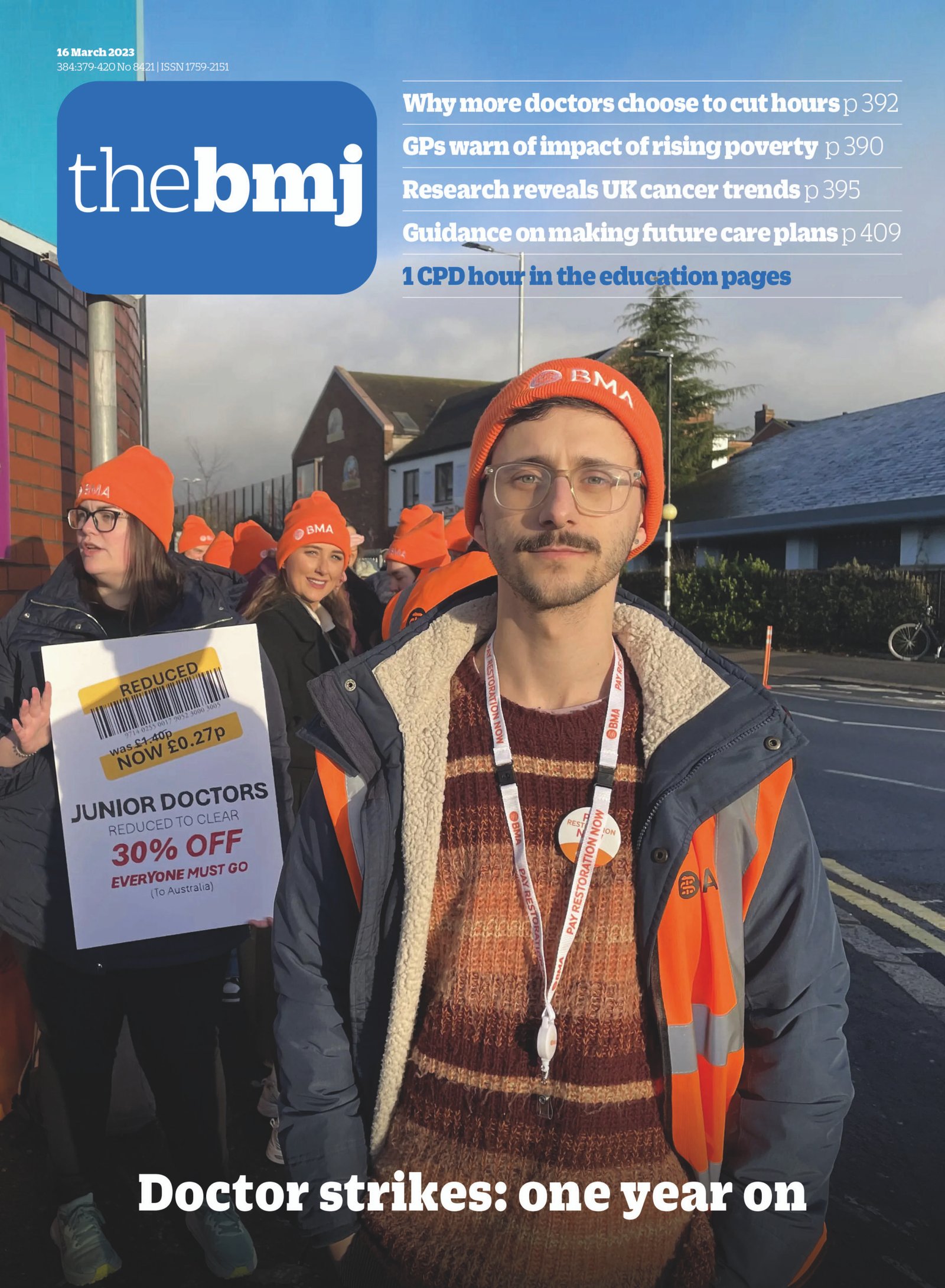An independent analysis of doctors’ pay in England confirms that the real terms value of their salaries has declined by a quarter in the 15 years since their pay was frozen. This fall, combined with a 25% increase in the cost of living in the UK over the same period, is disproportionately affecting the purchasing power of lower grade doctors, the analysis found.
General wage stagnation has become a feature of British working life,1 with UK salaries failing to keep pace with inflation, but the degree of salary erosion for medical professionals far outstrips that of UK workers in other sectors, including those in executive roles, the findings show. The analysis—conducted for The BMJ by the Office of Health Economics, an independent health economics research organisation—found that, across all grades, doctors’ salaries declined in real terms by an average of 25% between September 2008 and September 2023—a finding that mirrors analysis by the BMA.2 See box 1 for a detailed breakdown of how the analysis was conducted.
UK average earnings have dropped by 10% in real terms across all work sectors, and by 18% for executive roles, but the percentage decrease for doctors is much higher: 23% for foundation year 1 doctors (FY1s), 32% for FY2s, 27% for registrars, and 23% for consultants (fig 1, table 1, table 2).
Reduced purchasing power
The erosion of doctors’ salaries has coincided with a substantial increase in the cost of living, resulting in doctors’ purchasing power reducing considerably.

The analysis, published after 13 months of industrial action across the UK by the BMA that started with junior doctors in England,2 found that this decline in purchasing power is disproportionately affecting lower grade doctors. FY1 doctors have to spend 24% more of their salaries than they did in 2008 to afford the same basket of essential goods and services (food, drink, transport, energy, and housing); for consultants this figure is 7% (fig 2).
These essential expenses have increased in the UK by an average of 54% (table 3). House prices have also risen in real terms in England’s five most populous cities (table 4), making the challenge of home ownership even more daunting, particularly in places like London and Manchester, where house prices have risen by 31% and 21% respectively (box 2).
How necessary costs have changed since 2008
How house prices have changed since 2008
Home ownership is out of reach for even registrars
The aspiration of owning a house has now become out of reach for doctors in some cities in England. The average age of first time home ownership in the UK is 34, and doctors at this age are most likely to be registrars, but they can no longer rely on being able to afford a house near their workplace.
In 2008, a typical registrar earning £57 100 a year outside London or £59 262 in London could have got a mortgage of £256 950 or £266 679, respectively. This would have ruled out property owning in inner London, where a flat or maisonette averaged £278 512, but it would have been possible to buy a flat or terraced house in outer London or a detached house in Manchester or Birmingham.
In 2023, however, the situation was very different. A London registrar’s typical earnings of £66 351 a year, with a corresponding mortgage of £298 580, would rule out buying a property anywhere in London—the average price for a flat or maisonette was £549 141 in inner London and £337 217 in outer London. In Birmingham and Manchester, registrars would no longer be able to consider detached homes, but would be able to afford a semi-detached home, with their typical earnings of £64 189 a year, with a corresponding mortgage of £288 852.
Economists ran the same analysis for a comparator year to check that the findings were consistent over time, comparing the salaries and cost of living in September 2010 with September 2023. Although the salary erosion was slightly less, the results indicate the same direction of travel: there was substantial salary erosion across all grades—by 19% for FY1s, 21% for FY2s, 18% for registrars, and 17% for consultants.
Mireia Jofre-Bonet, chief research officer and head of education at the Office of Health Economics, says that the findings provide valuable insights into the major shifts in doctors’ real terms wages and living costs over the past 15 years in the UK—and may inform current pay negotiations. “As discussions about doctors’ pay are currently underway, it’s crucial to consider these trends for a comprehensive understanding of the situation,” she says.
The research aligns with that conducted by the BMA—it says that doctors require a 35% pay rise to correct the 26% pay erosion since 2008.12 “Both the private and public sectors experienced a fall in pay in real terms after the financial crash in 2008,” says Vivek Trivedi, co-chair of the BMA junior doctors committee, in response to the findings. “But in the private sector, which makes up 80% of the UK workforce, we saw pay levels rebound relatively quickly, while the public sector bore the brunt of austerity. And within the public sector, doctors have taken a specifically harder hit—so the level of pay erosion has been even stronger.”
Robert Laurenson, fellow co-chair of the junior doctors committee, argues that doctors are disadvantaged financially throughout their postgraduate training because of the frequent demands to relocate.13 “Pay erosion is compounded by the geographical instability of our careers, rotating every 4, 6 to 12 months,” he tells The BMJ. “That lends itself to not being able to benefit from things like fixed tariffs from energy companies or to commit to something as significant as a mortgage if you can afford it, and you’re constantly at the whim of the rental market.
“The earlier you accumulate wealth, the more compounding and the greater the benefit. Doctors enter the labour market two years later than traditional undergraduates, then they’re rotating jobs and exposed to increasing living costs and they’re only paid about £15.50 an hour from 7 am to 9 pm. As their pay is being eroded year on year, doctors find it more and more difficult to aspire to those traditional British expectations of things like home ownership.”
The Doctors’ Association UK is not putting a figure on the salary increases doctors need, but it aligns with the BMA on the need to value doctors properly. “Our pay should reflect levels of training and expertise that doctors have, as well as the levels of responsibility that we carry. It’s as simple as that. And our pay should keep pace with inflation,” says Helen Fernandes, co-chair of the association.
NHS England did not respond to The BMJ’s request for comment.
What do policy experts say?
Institute for Public Policy Research
Annie Williamson, NHS junior doctor and associate researcher at the Institute for Public Policy Research: “The stark reality of falling real pay for junior doctors deepens despondency and our sense of being undervalued. Every colleague leaving for Australia cites the squeeze on pay, yet we need the NHS to deliver first rate care more than ever. The first step must be to recognise and retain the hardworking staff that form the backbone of this service.”
Nuffield Trust
Billy Palmer, senior fellow at Nuffield Trust: “Over a longer timeframe, doctors’ pay has ebbed and flowed compared with cost of living, but undoubtedly there has been a substantial decrease in pay compared with inflation since the last peak around 2008. This analysis is important as it explains why some doctors—dependent on where they live or what the balance of their outgoings are—particularly feel the effects of recent real terms pay cuts.
“The recent sustained period of industrial unrest underlines the importance of pay and that current pay review policies and processes increasingly look unfit for purpose. While overall career earnings are fairly high for doctors, graduates are often burdened with high debt and inflexible rotas. There is a strong case that the government should urgently revisit whether the balance of doctors’ pay between early, mid, and late career and between pay and pensions contributions could be improved to create a sustainable medical workforce.”
Health Foundation
Elaine Kelly, assistant director of the Health Foundation’s REAL Centre (Research and Economic Analysis for the Long Term), which carries out analyses for long term decision making in health and social care: “Recent and ongoing strike action show that doctors clearly feel undervalued. This is backed up by NHS staff survey data, which show high levels of stress and burnout, low morale, and declining satisfaction with pay among NHS staff. The Health Foundation does not have a view about the ‘right level’ of pay for doctors, but the decline in the real terms value of their earnings is clearly a significant factor behind these findings and the current industrial action. It is vitally important for patient care that doctors and the government settle pay disputes as soon as possible.”
Centre for Cities
Anthony Breach, associate director at the think tank Centre for Cities and one of its experts on housing and planning: “If we had significant planning reforms and made it much easier, much more certain to build houses, that would essentially, for a large number of public sector workers, translate into the equivalent of a public sector pay rise. Even if the pay agreements between the government and public sector pay bodies and unions were the same, if workers had lower housing costs, that would translate into real improvements in their living standards.”
“I can’t afford breakfast or to join a gym”
Narut Pakunwanich, 24, FY1 doctor, West Suffolk
“Our pay is not great. I don’t want to complain too much because I know that there’s a cost of living crisis, and I do a lot of public health work in terms of food security for children, so I know it can get much worse. And I don’t want to sound unappreciative about where I am right now in terms of pay. But in terms of doctors’ pay in general, and in comparison with international pay rates, I don’t think we’re paid what we really should be.
“I’m a very low cost person: I live in a shared house; I try to get things for free, like I try not to pay for work conferences; I walk to work; and I like to save for a rainy day. After my bills are paid, I have about £600 in disposable income, so about £150 a week.
“Sometimes I want to go home and see my parents in Newcastle. That’s £80 there and £80 back so that’s all of my disposable income for that week. I spend about £15 a day on food. I skip breakfast because I can’t afford it. I eat in the hospital canteen at lunchtime—that’s £5 a meal. Then I go home and eat a ready meal for about £3—you can buy three for £9. I also buy something else for about £2—some fruit, for example. Fruit is really expensive now. I sometimes get a take out. I don’t have a gym membership: I’d like one, and there’s a gym just five minutes away from my house. But I think it costs about £20 or £30 a month and that’s a lot of money.
“I am currently an academic trainee, working in psychiatry in Bury St Edmunds, but the academic foundation programme is at Cambridge University, so I have to travel there by train, too—that’s about £15 each time.
“When I compare my salary with other professions, I don’t feel too bad. I know that a lot of my friends from secondary school went into finance, and they certainly get a lot more than I do, but I don’t feel that we’re paid that badly compared to, say, nurses. I think nurses should be paid a lot more for all the work that they do. I don’t think academics get paid that well, either.
“But even though I don’t feel like I have the right to complain too much, I still agree with the BMA, and I do strike and I do agree that I’m not worth less than a doctor was 15 years ago.”
Monthly outgoings:
-
Rent: £700
-
Transport: £95 (based on travelling home and to academic training once every two months)
-
Bills: £159 (council tax £80; electricity £25; gas £25; internet £13: water £16)
-
Food and eating out: £450
-
Total outgoings: £1404
-
Disposable income: £624
“I always thought doctors would be able to afford to have a wedding or to buy a house”
Penelope Sucharitkul, 24, FY1 doctor, Filton, South Gloucestershire
“If I wasn’t living with my partner, I would struggle financially. He’s an engineer; we met at university, and he’s been working now for two years, as my course was longer. Every month he saves, but I haven’t managed to. He earns significantly more than me, about 20% more, and he also gets company benefits on top, including funded career education, such as a part time masters degree, all expenses paid, liberal overtime pay, and stocks and shares.
“I find my disposable income is swallowed up with living costs and other expenses, such as career expenses. I booked a surgical exam in May, for example, which cost £500. Last month I went to a conference in Dublin and that cost me another £500. That used up half my disposable income that month.
“Housing is a massive topic of conversation among doctors. A lot of medic friends live in house shares, with eight or nine people, and are struggling with really high rents. Some are paying £900 a month for a room in a house, just to be close to work. Junior doctors usually live with friends or parents. I have noticed that more senior doctors who have their own houses usually have partners in other industries. I don’t know any doctors who’d be able to buy a house on their own.
“In Bristol and around it, competition for accommodation is really high. There were 82 enquiries for the two bedroomed apartment I rent with my partner, and the only reason we got it was because my partner already rented in the city, so he’d already been vetted as a tenant. Ideally, we want to buy a three bedroomed house because my partner needs an office to work in. We can’t afford to look in Bristol—that would cost around £600 000 in the less expensive areas—so we’ll look to buy in the suburbs. It will probably be an unequal split, which I would prefer not to have, but it’s just unrealistic to have an equal split with my financial situation.
“But we will continue renting for some time as we are getting married next year, and we can’t afford to do that and get a deposit together in the same year. I always thought doctors would be able to afford to have a wedding or to buy a house. And now I find I’m not really managing to save much at all. If I didn’t have the second salary, I’d be struggling a lot more.”
“There are easier ways to make a lot more money”
Kayode Oki, 30, FY2 doctor, London
“My pay is rubbish. I work a 45 hour week in oncology, and, after all my bills are paid, I’m left with about £200 a week as disposable income. That’s to cover my enjoyment and leisure—for example, my gym membership, which is important to me. But it also has to cover my exam fees, revision material, and extra courses for professional learning. That’s tough. I’ve just paid for the first part of my surgical exam. That was £578.
“If it wasn’t a job that I enjoyed and spent so much time working towards, I would probably be doing something else. I always tell people that if you’re going into medicine for money, don’t, there are easier ways to make a lot more money.
“I choose to commute out of London to my current job in Surrey. I don’t live with any medics so it’s interesting to compare salaries and working hours with my flatmates. If they work late, they get benefits such as free food delivery and a taxi home, as recognition that they have had to work late to meet the needs of the service or business. I have friends at one company that have a free canteen.
“I don’t think anyone’s job is easy, but I think other industries seem to provide the support you need to work at high intensity for long periods of time, whereas as medics we don’t necessarily get that.
“I spent my first foundation year clearing my debts, so I couldn’t afford to pay for any career extras, such as conferences. I did a previous degree, so I didn’t get my tuition fees for medicine at Dundee University. I built up debts even though I worked throughout—I was a healthcare assistant, a waiter, and over the summer holidays I worked as a youth worker helping on summertime programmes for children.
The doctor who quit: “I loved medicine, but I hated the pay and the way doctors were treated.”
Declan Murphy, 29, a former ophthalmology trainee from Newcastle, quit medicine in 2023.
“When gas prices went up dramatically in Autumn 2022, I remember thinking that I might have to sell my house because I might not be able to afford to continue living here. That was a lightbulb moment for me. If you had asked me when I was a 17 year old schoolboy whether a surgeon running the emergency eye department and operating on people to save their sight would be worrying about affording a gas bill, I would have thought not. You would not expect a doctor to be having to face that challenge.
“I’m not one of these people who wastes money. This was me living very much within my means and yet, here I was still being concerned about affording to live in my home. It’s something that I find really quite offensive, considering the amount of training I had done and everything I’d gone through. I was an ophthalmology trainee when I bought my house in Newcastle in 2021 for £195 000. Depending on how much on-call work I did, after tax and university debts, I would earn between £2300 and £2500 a month, but after bills were paid, I was surviving on £500 a month.
“I worked out that I could do three cataract surgeries an hour, and I was on £18 an hour after tax and university debt, so I was basically being paid £4.50 for each cataract surgery. So you’ve helped someone who couldn’t see, couldn’t drive, couldn’t see their grandkids, and that’s all corrected three hours later. And you are getting less than a fiver for that. I just love seeing the response I get when I tell people that.
“Things reached a head. I’d turn up to work and just sit in my car for 30 minutes to prepare for the day ahead. As well as the low pay, I did not appreciate the way I was treated at work. Eventually I decided I was not willing to accept this environment, and I left my job in January last year.
“It was a very difficult decision. I had worked really hard since I was 15 years old. I was a council house kid and carried all the ambitions of my family to get into medical school. I’d hoped to be able to eventually support my parents because medicine was portrayed as being well paid, but that was clearly not the case. I thought that nothing’s going to change, the culture is terrible, and I just saw it getting worse. So I decided to check out.
“After I left, I was forced to move back home while I set up a property business, providing short term and temporary accommodation for councils. Happily, it proved to be successful—in the first six months I made £140 000, and I could move back to my house. I’m so much happier now I’ve left medicine. And I have no regrets—other than choosing medicine in the first place.
“I think doctors are often embarrassed to talk about their pay, but they should. Doctors are not fairly rewarded compared with other industries, or even when you compare their pay to other healthcare workers. If somebody is less experienced, less legally responsible, and makes fewer decisions, they should not be paid more than you. Band 6 nurses are paid more than FY1 doctors, midwives graduate as band 6 clinicians, physician associates get paid significantly more than doctors. As an FY1 doctor you are on about £14 per hour and working alongside healthcare assistants who earn £11 or £12 an hour.
“Whether you like it or not, pay is related to your expertise and responsibility, and the degree of value which a system or company places on you as an employee. There’s a reason that managers get paid more than someone who’s on the apprenticeship, and rightfully so. In every industry but healthcare, that’s just common sense.”










